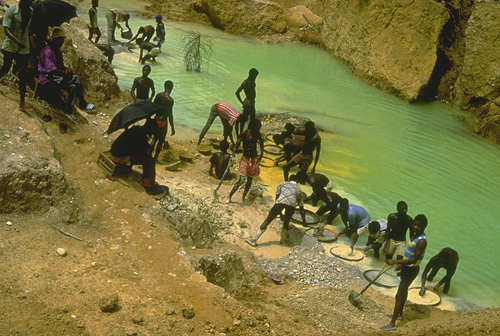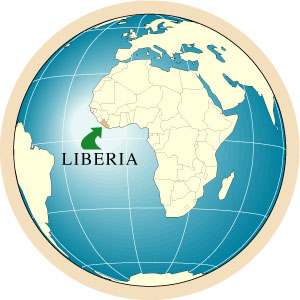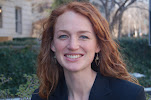When I arrived in Monrovia, I was informed by Minister Sayeh that the scope of my internship would include a focus on Liberia’s budget. A draft of the national budget had been submitted by the President to the Legislature less than two weeks before I landed in Monrovia. I was just in time, the Minister explained, to work from the end of the Ministry of Finance until it was passed. Stacked against the other issues I had been tasked to work on --- investment policy, debt relief, fiscal policy – the budget seemed, well, a bit dull.
What I did not realize then was that the Minister had just given me a front row seat to the summer’s most explosive drama. In fact, the high profile budget saga that unfolded over the next two months had more sensational plot turns, surprise twists, and preposterous characters than in an entire season of the soap opera “Days of Our Lives.” (Even in its most ridiculous heyday, when Marlena was possessed and Stefano died and came back to life, again.)
My initial read of the draft budget didn’t give even the slightest hint of the ensuing controversy. In fact, during my first tasks of writing talking points for the Cabinet and press releases for the newspapers, I could find nothing but good news to tell. Thanks to robust revenue growth, the draft budget represented a 40% larger pie than the previous year. It was hard to argue with the sectors that stood to benefit from this growth: compared to the previous year, education was to get an additional 44%, health an extra 28%, and public works (and in particular roads!) a needed 59% boost. Civil servants and retirees were designated lucky winners, with well deserved salary increases bound for grossly underpaid government employees. The pot of funds for community development in Liberia’s far flung villages would grow a bit fuller. And more money would be spent on job creation to make a dent into the country’s 85% unemployment rate. Clearly I didn’t need to be a spin doctor to tease out good PR for this budget. Liberia may not have a lot of zeros in its $180 million draft budget, but there is no question that it was aligning all of its pennies with the most important priorities.
Before I could kick up my heels and celebrate, however, the proverbial shit hit the fan. And who was doing the tossing? The Auditor General: the new bully in town, who catapulted overnight from total obscurity to (in)famous national figure. Who is the Auditor General, you might ask? Functionally, the Auditor General is an independent auditor appointed by the President to oversee post-audits of government spending. Reporting directly to the Legislature, the office of the Auditor General is designed broadly to strengthen public financial management and accountability. Normally this role is quiet, behind the scenes, and technical in nature. Normally, of course, but not in this instance. Personally, the Auditor General in Liberia is a relatively young and inexperienced Liberian named John Morlu who returned from many years in the United States to assume his new post. Mr. Morlu’s most distinguishable physical characteristic -- his short stature -- may not have merited psychological analysis, were it not for his decision to wear chunky platform shoes.
Despite his legal mandate to conduct post-audits of spending (translation: after the budget is implemented), Mr. Morlu quickly proved himself trigger happy. After only two months in the country and without ever consulting the Bureau of the Budget or the Finance Ministry, Mr. Morlu authored a dramatic 96 page treatise about the draft budget submitted by the Executive. Translation: a pre-audit. His complaints lodged against the draft budget ranged from the nit picky, such as a lack of page numbers, ironically written in his own page number-less report. To the misguided: criticisms based on misunderstandings that could have easily been cleared up had he simply consulted the government. And finally, to the sensational: allegations of an egregious lack of transparency, disclosure and accountability, and a bold statement that the Legislature’s passage of the budget would constitute a failure of their duty to the Liberian people.
Mr. Morlu unleashed a media frenzy when, without any warning, he brazenly fired off his 96 page treatise along with a confrontational cover letter to the President, the Legislature’s leadership, and the media, all at the same time. Suddenly the rosy front page headlines I had helped craft about the budget were replaced with the damning allegations of the Auditor General. Our team went into rapid response mode. We toiled on the ninth floor of the Finance Ministry until far past my bedtime and drafted the official response for the newspapers and media. The Minsitry chose to toe a sober, fact-based line and clarify the many incorrect accusations put forth by the Auditor General. In the meantime, the President sent a three page letter to the Auditor General that packed a lot more punch and put Mr. Morlu squarely in his place. And left me cheering over the tenacity of the “Iron Lady.” The letter was subsequently leaked to the press and soon became more ammunition in what was rapidly becoming a sensationalized battle, played out on airwaves and newspapers across Liberia.
The real firestorm was still yet to come. In an interview with Voice of America just a few days later, Mr. Morlu declared to the world that the current government was “three times more corrupt than the former interim transitional government of Charles Gyude Bryant that it replaced.” Morlu contended that he had proof based on a “risk analysis of government performance.” Yet this claim is as outrageous as his allegation of corruption: after just eight weeks on the job, the Auditor General had yet to conduct a single audit of either the interim government or the current government, and could not possibly have had valid data to defend such a sweeping assessment.
Mr. Morlu’s statement proved to be the figurative shot heard round the world, or at least around Liberia’s corner of West Africa. Over the next few weeks, the radio and newspapers talked of little else. “Three times more corrupt” was discussed all over Monrovia and everyone seemed to have a view: senators, government officials, men on the street. In the midst of this highly charged controversy, the Legislature announced a public hearing to debate the Auditor General’s concerns with the draft budget and called upon Mr. Morlu, the Budget Director, and (Finance) Minister Sayeh to testify. Another late night was pulled to help the Minister prepare her testimony, including her opening remarks and the responses to questions about the budget and revenue projections.
The atmosphere at the hearings was nothing short of a circus. The stage was actually set more for a circus than a government hearing: two floors of stadium-style seating overlooked the ground floor of the immense conference center, where the Legislature’s leadership and the key speakers sat. Filling one half of the seating on the ground floor were the members of the Legislature. On the other side and above sat the public: a rowdy group of some 200 men whose selective cheering revealed their overwhelming support for the Auditor General. (Or, perhaps, simply an opposition to the Executive). Filling the rest of the space were scores of journalists and armed UN security.
The hearings, dubbed by one newspaper as the “most anticipated” event of the year, commenced with opening remarks by the leadership of the Legislature, followed by statements made by legislators from their peanut gallery. The pomp and circumstance of these statements was striking. 20 journalists with microphones would swarm around a bellowing legislator as he stood shaking his fists, and would then sprint to the next ranting legislator and thrust their microphones in his face. The speeches were rewarded with loud cheers from the crowd, forcing the Speaker to repeatedly pound his gavel to maintain order.
The Auditor General was the first to be called to speak, and speak he did. For over an hour. Two weeks of national controversy served only to egg on Mr. Morlu, and his testimony was even more sensational than his earlier treatise. Minister Sayeh spoke next, and delivered her concise but extremely pointed opening remarks. The highlight: her line, “If the Auditor General needed to be educated about the budget process and public finances in Liberia, all he needed to do was ask.” Boo-ya. The Budget Director picked up where Minister Sayeh left off, delivering such an impassioned and hard-hitting oration that the crowd went wild. Unruly spectators from the stands spilled onto the main floor, angry legislators jumped to their feet yelling, and the futile gavel pounding of the Speaker did nothing to quell the chaos. In a matter of a few frenetic minutes, the hearing was cancelled, Minister Sayeh and other senior officials were evacuated by UN armed guards, and – at the height of absurdity – one of the most senior Cabinet members was accused of threatening a journalist. Which was later twisted to even more far fetched accusations of his threatening the Auditor General himself. The front page of all of the newspapers the next day showed a dejected journalist laying on the ground, a photo of the accused minister looking as if in a mug shot, and highly dramatized accusations that, in the US, would have led to lawsuits.
In the end, the Legislature did pass the budget last week. After two months of debate, one of the only changes that the Legislature prioritized was a very large increase in their own pot of money and personal benefits: far less attention was paid to addressing the concerns raised by the Auditor General, several of which were valid. Lost in the fist fighting was the actual substance behind the controversy: the budget. What the media, the public, and the legislators seemed to focus on were the sparks flying and not the source of the fire, and in the end very little was gained. The opportunity to constructively engage the public and the government on important issues of public financial management and the budget process, and ultimately raise the standards of the budget, was lost entirely. The budget that ultimately passed was not only no better than the draft critiqued by the Auditor General, in my opinion it was worse, with a disproportionately large budget for the Legislature that rivaled the entire education budget and dwarfed the spending in far more crucial sectors.
Liberia’s budget saga raised several lessons. The first is the challenge of effectively communicating facts and engaging the public on policy matters in the Liberian context -- one characterized by widespread illiteracy and very low levels of education. In such an environment, nuance and factual details are too easily trumped by a simple, powerful message like "three times more corrupt" that can easily be communicated, irregardless of its analytical merit. Magnifying this challenge is the weakness of Liberia's media. Far from playing a critical arbitrar in the sensationalized debate, helping readers sift through the hyped accusations, Liberia's newspapers simply played agitator.
A second lesson is the fragility of the reform process. Liberia's government is deeply committed to reforming its governance architecture, and has set off on an ambitious set of simultaneous reform: public financial management, legal and judicial reforms, and more. Troubling is the reality that an imperfect reform in one area can severely impair progress in another, derailing even the best of efforts. For instance, hiring an Auditor General should strengthen accountability and governance. Yet in this case, hiring the wrong Auditor General led to a mammoth distraction from the Government's earnest efforts to tackle corruption, and has resulted in the country losing some of the ground it worked so hard to gain. Likewise, a poorly functioning media can, counterintuitively, hinder efforts to inform the public and communicate facts over hype. And when self-serving Legislators are elected to serve the country, "good" democracy can be antithetical to good governance.
Far from being dull Liberia's budget process was, as it turns out, unforgettable.


















